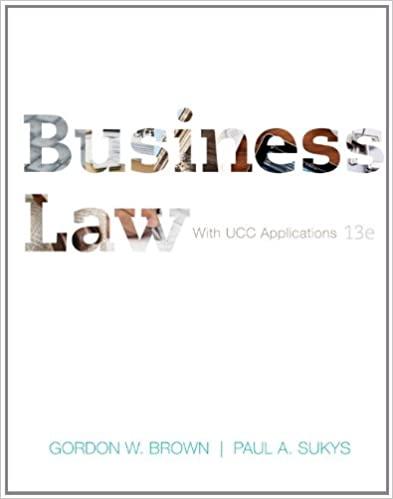Three American Express money orders were stolen from one of its agents, and 100 others were stolen
Question:
Three American Express money orders were stolen from one of its agents, and 100 others were stolen while being shipped to a different agent. When stolen, all of the money orders contained the preprinted signature of the chairman of American Express, but they were blank as to the amount, sender, and date.
Stacy Anne Dillabough presented two of the stolen money orders for payment at Chuckie Enterprises, Inc. (Chuckie’s), a check-cashing operation in Philadelphia.
The money orders were in the amounts of $550 and $650 and listed Dillabough as the payee and David W. (last name undecipherable) as the sender. Two months later, Robert Lynn presented another one of the stolen money orders for payment at Chuckie’s in the amount of $200, which listed himself as payee and Michael C. Pepe as the sender.
After being cashed at Chuckie’s, the money orders traveled the regular bank collection routes and were returned to Chuckie’s bearing the stamp “REPORTED LOST OR STOLEN—DO NOT REDEPOSIT.” American Express refused to pay Chuckie’s the face amounts of the money orders. Chuckie’s then sold them to Triffin, a commercial discounter. By written agreements, Chuckie’s assigned all of its right, title, and interest in the money orders to Triffin.
In court, Triffin obtained judgments by default against Dillabough and Lynn.
In a trial with American Express, the court found that the money orders were not negotiable instruments and entered a judgment in favor of American Express.
On appeal, the Superior Court reversed the trial court and held that the money orders were negotiable instruments and that Triffin had the status of a holder in due course, entitling him to recover the face amount of the money orders from American Express.
The Court’s Opinion The Superior Court has described the purpose of negotiable instruments and the Commercial Code as follows:
A negotiable instrument is an instrument capable of transfer by indorsement or delivery. Negotiability provides a means of passing on to the transferee the rights of the holder, including the right to sue in his or her own name, and the right to take free of equities as against the assignor/payee. [Citations omitted.]
The purpose of the Commercial Code is to enhance the marketability of negotiable instruments and to allow bankers, brokers, and the general public to trade in confidence. [Citations omitted.] As a matter of sound economic policy, the Commercial Code encourages the free transfer and negotiability of commercial paper to stimulate financial interdependence. The threshold question is whether the money orders qualify as negotiable instruments under Division Three of the Commercial Code, 3101, et seq., which governs negotiability.1 Both parties agree that if the money orders are not negotiable instruments, then Triffin’s claims against American Express must fail. Initially, we note that the Commercial Code does not specifically define the term “money order,” nor does it provide a descriptive list of financial documents that automatically qualify as negotiable instruments. Instead, 3104 (a) sets forth the following four-part test to determine if a particular document qualifies as a negotiable instrument:
A. Requisites to negotiability. Any writing to be a negotiable instrument within this division must:
1. be signed by the maker or drawer;
2. contain an unconditional promise or order to pay a sum certain in money and no other promise, order, obligation or power given by the maker or drawer except as authorized by this division;
3. be payable on demand or at a definite time; and 4. be payable to order or to bearer............
Question
1. What did the court say is the four-part test to determine whether a particular document qualifies as a negotiable instrument? Were these basic requirements changed by the 1990 UCC revision?
2. What does the definition of a signature on a negotiable instrument include?
3. How did the court respond to American Express’s argument that the following words created a condition: “this money order will not be paid if it has been altered or stolen or if an indorsement is missing or forged”?
4. Why does the fact that the money orders were completed without authorization and not delivered have no effect on negotiation of an instrument?
5. Why could Triffin not become a holder in due course?
6. Why could Triffin acquire the status of a holder in due course?
7. In his dissenting opinion, what argument did Mr. Justice Castille use to try to persuade the other justices that the money orders were not negotiable?
8. Do you agree with the dissenting opinion? Why or why not?
Step by Step Answer:

Business Law With UCC Applications
ISBN: 9780073524955
13th Edition
Authors: Gordon Brown, Paul Sukys





